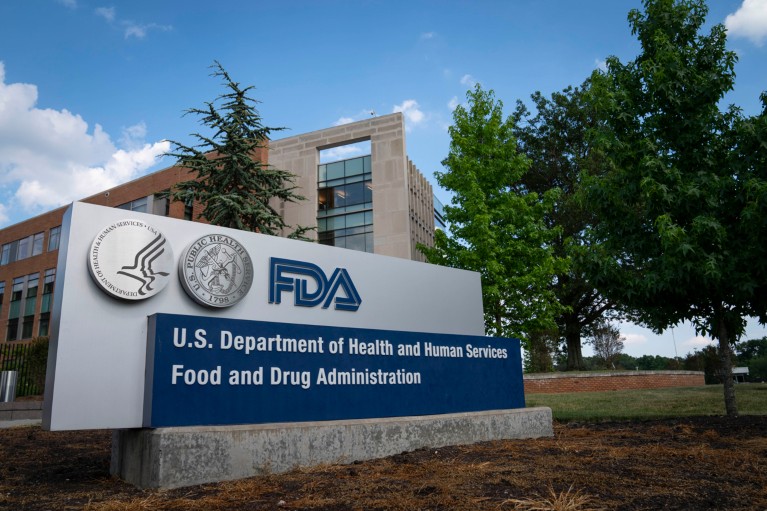
The US Food and Drug Administration, based in White Oak, Maryland, is considering whether to overhaul its use of advisory panels.Credit: Sarah Silbiger/Getty
Researchers are calling on the US Food and Drug Administration (FDA) to be more transparent in how it incorporates recommendations from independent scientists on its advisory panels when it approves drugs or makes other key decisions.
Will the FDA change how it vets drugs following the Alzheimer’s debacle?
These pleas came during a 13 June public listening session organized by the agency to ‘optimize’ its use of the panels, which are composed of scientists and industry and patient representatives. They also follow some controversial decisions made by the FDA in recent years to approve drugs against the recommendation of its advisers — as well as hints made by FDA commissioner Robert Califf that he would like these panels to host fewer votes. Usually, at the end of advisory meetings, after panellists have heard evidence about the safety and performance of a potential drug or medical device, they vote to either formally recommend that the FDA approve it or not.
That the agency is considering revamping its advisory-committee procedures is a “huge deal”, given that much of the world looks to the FDA for its scientific analyses, says Reshma Ramachandran, a health-services researcher at Yale School of Medicine in New Haven, Connecticut. “They don’t do this often.”
At the listening session, Califf said that “one of the most difficult areas that we need to address” is how to have a disagreement as a scientific community “without undermining the public’s confidence and trust in science”.
Pointing to some of the high-profile cases in which the FDA has overridden the consensus of its advisers, Peter Lurie, president of the Center for Science in the Public Interest in Washington DC, tells Nature that it’s “hard to escape the suspicion” that any move to get rid of voting isn’t just “rooted in a desire to avoid controversies”.
High-profile overrulings
The FDA typically uses its 50 advisory committees and panels only in situations that warrant additional analysis — for example, the first time a specific class of drug comes up for approval, or when a broader discussion is needed about how to measure the success of treatments for a particular disease.
MDMA therapy for PTSD rejected by FDA panel
The advisory committees are just that — advisory — leaving the FDA to make the final decision, usually within months of a committee meeting. Yet the agency’s decisions usually align with its advisers’ votes: one analysis of panels from 2010 to 20211 found that the agency’s actions mirrored its committees’ votes 97% of the time when the committee voted in favour of the treatment, and only 67% of the time when it did not.
For example, in 2021, despite a nearly unanimous vote suggesting the agency should reject the Alzheimer’s drug aducanumab, the FDA approved it. The advisers thought that safety concerns over the drug, an antibody intended to reduce the accumulation of protein plaques in the brain associated with Alzheimer’s, outweighed the limited evidence that it improved cognition in a subgroup of people.
Three advisory-panel members resigned to protest the decision, and an inquiry by the US Congress later found that the agency’s approval process had been “rife with irregularities” and involved “lapses in protocol”, including an unusually close coordination between FDA officials and the biotechnology company that developed aducanumab, Cambridge, Massachusetts-based Biogen. The firm discontinued the drug in January of this year.
In addition to this and other high-profile overrulings that have put the spotlight on how the FDA uses its advisory committees, the agency has been making its panels more accessible. Since the COVID-19 pandemic, meetings have been held virtually, which has increased media attention and participation from the public, Ramachandran says. This tension became clear at the listening session, when several patients and their families called on the agency to listen to their lived experiences and increase patient representation on the advisory committees.
Airing concerns
Since taking the helm of the FDA in 2022, Califf has suggested at conferences and in media interviews that he would like advisory-committee members to have “more space to meet and discuss the issues”, with less emphasis on voting, according to the healthcare-news website Regulatory Focus. He has said that part of his motivation is that the public sometimes confuses the advisory-committee votes with the agency’s ultimate decision.
Crackdown on skin colour bias by fingertip oxygen sensors is coming, hints FDA
Many researchers at the 13 June listening session agreed with high-ranking officials at the FDA who have publicly disagreed with Califf on this issue. Without voting, it’s “harder to crystallize the recommendations from a long day of [panel] discussions”, making it possible for an overzealous company to, for example, more easily spin the discussions at a meeting to give a favourable impression of its drug through public relations, says Aaron Kesselheim, a health-policy researcher at Harvard Medical School in Boston, Massachusetts.
Kesselheim tells Nature that the FDA should certainly reflect on public trust and confusion. But he says that the voting process isn’t the problem; instead, when the FDA goes against its advisers’ recommendations, it should spend extra time explaining its reasoning as to how and why it made its decision, he adds.
That would be in stark contrast to current practices, Ramachandran says. In a forthcoming publication, she and her colleagues analysed the FDA’s press releases for new-drug approvals and found that the agency generally does not mention whether there has been an advisory-committee meeting and what the outcome was.
Kesselheim suggests that instead of scrapping voting, the agency should standardize its voting questions — which often vary depending on the committee and topic at hand — given that research has shown that small changes in wording can heavily influence voting outcomes. In addition, he is worried by the dwindling proportion of new-drug approvals in recent years2 that have undergone discussion by an advisory committee.
The FDA has not yet proposed any specific revisions to its advisory-committee procedures. It is also accepting written comments until 13 August.




